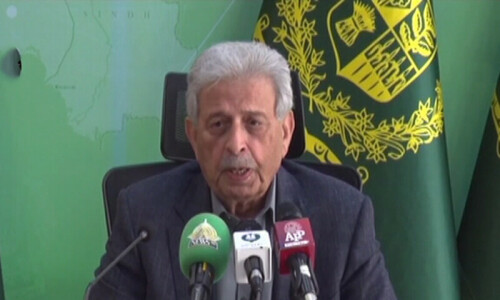ISLAMABAD: The Pakistan Electric Power Company (Pepco) — a defunct holding company of the Power Division — has reported total payables by sector power companies at Rs1.882 trillion as of Jan 31.
In a report submitted to a Special Committee of the Senate, Pepco reported total receivables of the power sector at Rs1.178tr. That would mean that even if all the receivables of the power companies were recovered, there would still be gap of Rs704bn to be funded by the government through borrowing or increase in consumer tariffs.
The report said the public sector payables to the Independent Power Producers amounted to more than Rs696 billion by the end of January. Surprisingly, the government-run power companies have also been holding back payments to the Water and Power Development Authority (Wapda). The payables to Wapda amounted to about Rs222bn by end-January.
Payables against oil suppliers and gas suppliers amounted to Rs75.2bn and Rs82.27bn respectively while circular debt parked against the Power Holding Private Ltd — another holding company of the Power Division — increased to Rs807bn.
Strangely though, the Pakistan State Oil (PSO) alone has reported total receivables of more than Rs357bn, including Rs140bn from public sector generation companies as of Feb 20. The PSO’s total receivables from the power sector amounted to Rs206bn, Another Rs151bn are payable by other entities including Rs94bn by the Sui Northern Gas Pipelines Limited on account of Liquefied Natural Gas non-payments and Rs57bn payable by the Pakistan International Airlines and the Ministry of Finance.
Of the total Rs1.178tr receivables of the power companies, the outstanding amounts against the public sector entities and K-Electric amounted to Rs670bn. This included Rs17bn against federal government, Rs127bn against AJK government, Rs283bn against agriculture tube wells in Balochistan, Rs137bn against K-Electric, and Rs38bn against FATA and about Rs62bn against provincial governments.
Strangely, the outstanding dues against private consumers stood at Rs509bn by end of January this year even though the distribution companies usually disconnect electricity connection for non-payment of electricity bills within 30 days.
Pepco report explained the circular debt was emerging mainly due to non-availability of required funds to pay off the liabilities of power producers because of shortage of cash flow. It blamed almost all the public sector entities for the buildup of circular debt.
On top of all, Pepco blamed the delayed and inadequate tariff determinations by the National Electric Power Regulatory Authority (Nepra), delayed tariff notifications by the federal government, excess losses and low recovery by the distribution companies (Discos) against Nepra targets, nonpayment of subsidies by the federal government in a timely manner, non-payment of dues by AJK, FATA, Balochistan Tubewell and KE and funds held by the federal board of revenue on account of tax paid on billing instead of collections and obstacles in payment of refunds.
Pepco also reported that average electricity sale rate to consumers had increased by Rs3 per unit — about 23.4 per cent in six months — between August 2019 to January. The report said the average sale rate stood at Rs12.77 per unit which increased to Rs14.88 per unit in November and Rs15.76 per unit in January.
Informed sources said the power companies have already sought a fixed fuel price increase of about Rs1.50 per unit for discos for three months (November-January) based on actual requirement of about 90 paisa adjustment for one month, Rs1.2 per another month and about Rs1.50per unit for third month.
This could create additional revenue cushion to the power companies because under the existing mechanism fuel price adjustment of every month is fixed separately and comes into force on expiry of the previous month.
Published in Dawn, March 4th, 2020


















































